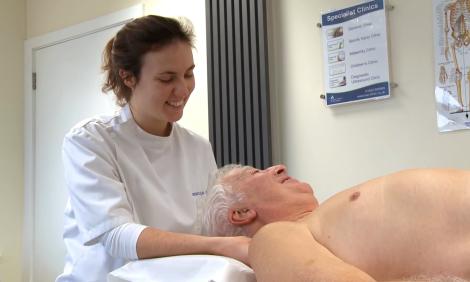Osteopath
Osteopaths prevent, diagnose and treat a wide range of health problems using manual therapy, exercise and advice. Their aim is to promote the best health, based on the individual needs of the patient.
Working life
You'll work as a self-employed primary care practitioner who's able to diagnose and treat a wide range of health issues. You'll able to spend substantially more time with patients than most professionals in primary care. There are also opportunities to work within the NHS and in secondary care.
You'll be an expert in the musculoskeletal system and its relationship to other systems of the body in the promotion of good health.
You'll provide care that includes a range of interventions specific to each patient, including:
- manual therapy techniques
- physical therapy (rehabilitation and exercise prescription)
- health advice
- self-management guidance
Who would I work with?
You'll be trained to work with patients of all ages and skilled at identifying a wide range of health conditions. You'll refer to other healthcare professionals to achieve the best outcomes for the patient. You may also work in private healthcare with other healthcare specialists.
Most osteopaths are self-employed with increasing opportunities to work in the NHS in multidisciplinary musculoskeletal units, where they may work as part of a team including acupuncturists, physiotherapists, podiatrists and psychotherapists.
Andrew MacMillan
Osteopath and research lead
Read Andrew's storyBeing an osteopath is a very rewarding job. There are opportunities to progress your career as well as flexibility in the hours I work.

Entry requirements and training
You'll be trained to degree level gaining either a Bachelor’s (BSc) or Masters of Science (MSc). Courses typically last three to five years and are a combination of academic, research and over 1,000 hours of patient-facing clinical training. This intensive medical training will equip you with an in-depth knowledge of anatomy, physiology, psychology and pathology combined with clinical examination techniques.
Following your training, you must register with the General Osteopathic Council to practice in the UK.
Where the role can lead
After graduating, you may choose to set up your own private clinic, work in the NHS or in private healthcare. You may then choose to become an advanced clinical practitioner through postgraduate training in a specific area of practice such as sports injuries, care of the elderly or working with children. There are also opportunities for study at MSc and PhD level. Non-clinical career roles also exist in teaching, professional development and research.
In the NHS, you may choose to expand your post by taking on management and leadership responsibilities.
Pay and benefits
In the NHS, your standard working week will be around 37.5 hours. As an NHS osteopath, you’ll be paid on the Agenda for Change (AFC) pay system, typically starting on band 5. You’ll also have access to our generous pension scheme and health service discounts, as well as 27 days of annual leave plus bank holidays.
You are more likely to work for yourself, which many osteopaths find an attractive option as it allows for greater flexibility and choice for career progression.
Displaying 6 - 10 of 18 matches
-
Osteopathic Medicine
Plymouth Marjon University
View courseOpens in a new window
- Qualification
- Master of Osteopathy - MOst
- Study mode
- Full-time
- Duration of the course
- 4 Years
- Leading to a career in
- Osteopathy
- Contact details
- [email protected] 01752 636890
- Region
- South West
- Admissions address
- Plymouth Marjon University
Derriford Road
Plymouth
PL6 8BH
United Kingdom
-
Osteopathy
Health Sciences University
View courseOpens in a new window
- Qualification
- Master of Osteopathy - MOst
- Study mode
- Full-time
- Duration of the course
- 4 Years
- Leading to a career in
- Osteopathy
- Contact details
- 020 7089 5316
- Region
- London
- Admissions address
- 275 Borough High Street
London
SE1 1JE
United Kingdom
-
Osteopathy
Anglia Ruskin University
View courseOpens in a new window
- Qualification
- Bachelor of Osteopathy (with Honours) - BOst (Hon)
- Study mode
- Full-time
- Duration of the course
- 3 Years
- Leading to a career in
- Osteopathy
- Contact details
- [email protected] 01245 686868
- Region
- London
- Admissions address
- The Grange
12 Grange Road
London
SE1 3BE
United Kingdom
-
Master of Osteopathy
Health Sciences University
View courseOpens in a new window
- Qualification
- MOst
- Study mode
- Part-time
- Duration of the course
- 5 years
- Leading to a career in
- Osteopathy
- Contact details
- [email protected] 020 7089 5316
- Region
- London
- Admissions address
- 275 Borough High Street,
London SE1 1JE
-
Osteopathy
Anglia Ruskin University
View courseOpens in a new window
- Qualification
- BOst (Hons)
- Study mode
- Part-time
- Duration of the course
- 5 years
- Leading to a career in
- Osteopathy
- Contact details
- [email protected] 01245 686868
- Region
- London
- Admissions address
- The Grange
12 Grange Road
London
SE1 3BE
United Kingdom





